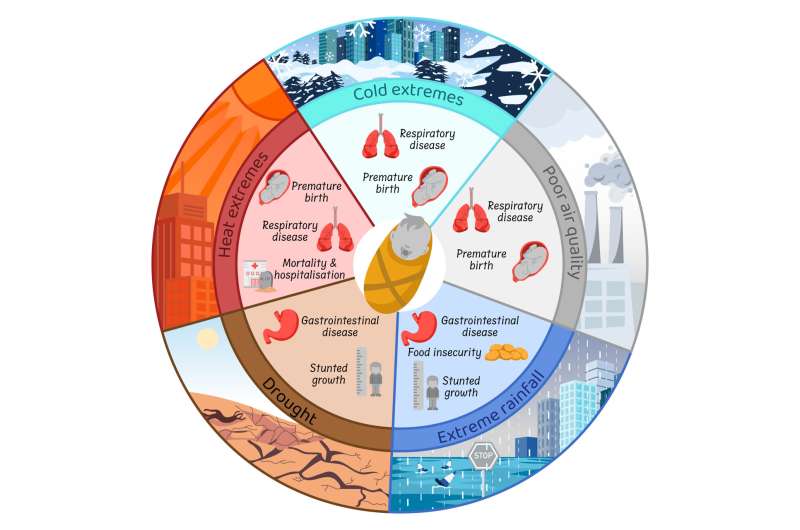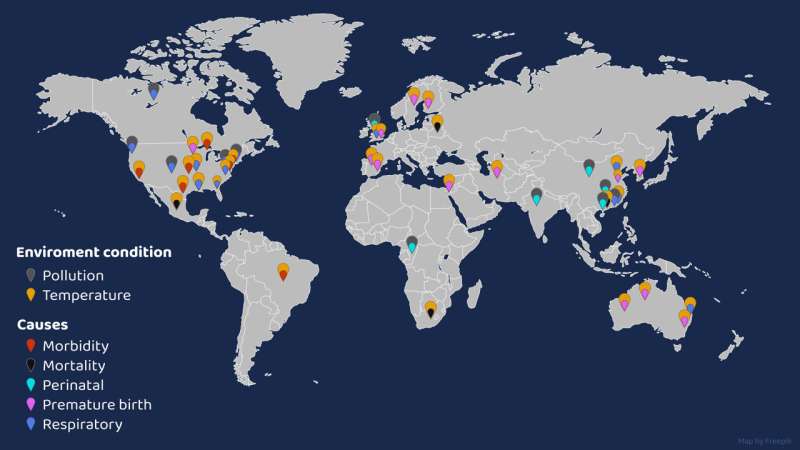This article has been reviewed according to Science X's editorial process and policies. Editors have highlighted the following attributes while ensuring the content's credibility:
fact-checked
peer-reviewed publication
trusted source
proofread
Climate change shown to increase the risk of preterm births by 60%

Increased numbers of preterm births, higher incidence of respiratory disease and death, and more children in hospitals are some of the stark health outcomes the world is facing from the impacts of extreme climate change.
This morbid reality will devastate children's health for generations without global action, according to alarming new research.
Scientists have spent decades warning the world about the risks of extreme temperatures, floods, and bushfires, but this new study published in the journal Science of the Total Environment is the first to collect all the available scientific evidence for the effects of climate change on children's health.
The data identified which particular climate-driven extremes are linked to certain detrimental health impacts for future generations.
The study led by Dr. Lewis Weeda, a researcher with The University of Western Australia and the Wal-yan Respiratory Research Centre at Telethon Kids Institute, and Matthew Flinders Professor of Global Ecology, Corey Bradshaw, from Flinders University shows that the risk of preterm birth will increase by 60% on average from exposure to extreme temperatures.
The researchers reviewed the results of 163 health studies from around the world to inform planning by governments that could mitigate and improve health outcomes for future generations against the impacts of climate change.
Professor Corey Bradshaw said the global data had revealed a worrying increase in preterm birth rates that could cause lifelong complications for millions of children around the world.
"We've crunched the data to show how certain types of future weather events will worsen particular medical issues in the population," he said.

"We identified many direct links between climate change and child health, the strongest of which was a 60% increased risk on average of preterm birth from exposure to temperature extremes. Respiratory diseases, mortality, and morbidity, among others, were also made worse by climate change.
"The effects of different air pollutants on children's health outcomes were smaller compared to temperature effects, but most pollutants still had an effect of some type, so the news is concerning. The children's health issues we identified depend on weather extremes—cold extremes give rise to respiratory diseases, while drought and extreme rainfall can result in stunted growth for a population."
Most of the analyzed studies were in high-income nations, despite the fact that children in lower-income countries are most likely to go without adequate access to health care, infrastructure, and stable food supply.
The research revealed that even advanced economies would not avoid the impacts of climate change on children's health. The researchers warn that health risks vary across continents and depend on socio-economic circumstances.
"Given that climate influences childhood disease, social and financial costs will continue to rise as climate change progresses, placing increasing pressure on families and health services. For example, asthma has been estimated to cost as much as US$1.5 billion due to a single fire season in the future, while another study estimated the costs of a single case of childhood asthma at up to US$23,573 in the coming years," Professor Bradshaw said.
Geography also dictated the health impacts of climate change according to the research. For example, in Australia, extreme temperatures have led to an increase in premature births on the East Coast, Northern Territory, and Western Australia and enhanced respiratory issues in Queensland, while similar temperatures have caused higher mortality rates in South Africa.
Dr. Weeda said action is required to protect children from climate-related diseases.
"Our research recognizes some important areas where children are most vulnerable to climate change," he said. "The development of public health policies to counter these climate-related diseases, alongside efforts to reduce anthropogenic climate change, must be addressed if we are to protect current and future children."
"Finding solutions and implementing climate adaptation and mitigation policies would positively impact multiple United Nations Sustainable Development Goals. Climate change is universal and adversely affecting all countries and people, and we must prepare societies for mounting threats to child health."
More information: Lewis J.Z. Weeda et al, How climate change degrades child health: A systematic review and meta-analysis, Science of The Total Environment (2024). DOI: 10.1016/j.scitotenv.2024.170944



















